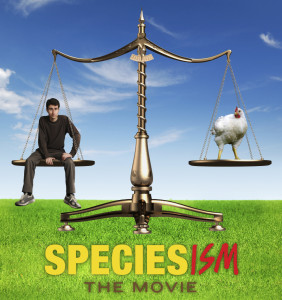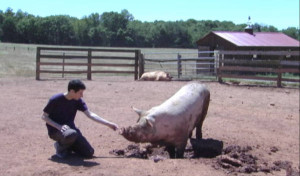Mark DeVries Biography

Mark DeVries is a documentary filmmaker whose award-winning work has been viewed by tens of millions internationally and received major press coverage—ranging from CNN Headline News to The Joe Rogan Experience.
Mark DeVries also pioneered the use of aerial drones to investigate environmental issues, and he is an attorney licensed to practice law in Washington, DC.
Mark DeVries’s newest documentary, Humans and Other Animals, is now streaming on Amazon Prime and other major platforms.
Mark DeVries Press Coverage
The Huffington Post: “Speciesism: The Movie may change your worldview”

Every now and then, a movie comes along that is capable of fundamentally changing the worldview of its audience. Speciesism: The Movie, a new documentary by Mark DeVries, is that kind of film.
The word “speciesism,” which has been popularized by Princeton bioethicist Peter Singer, refers to the assumption that a vast gulf exists between the ethical value of human interests and the ethical value of the interests of other animals. At its extreme, we may see ourselves as the only species that matters morally, and view other animals as existing merely for our use. . . . Like those who grew up having overt racist beliefs assimilated into their worldview, some degree of speciesism has been so well-assimilated into the worldview of most of us that it does not even appear to be worth questioning.
Of course, other animals possess the same five physiological senses that we do, as well as the capacity for a wide range of emotions. In her introduction to The Inner World of Farm Animals, Dr. Jane Goodall writes that “farm animals feel pleasure and sadness, excitement and resentment, depression, fear, and pain. They are far more aware and intelligent than we ever imagined . . . they are individuals in their own right.” And Dr. Temple Grandin, in Animals in Translation, writes that “When it comes to the basics of life . . . [other] animals feel the same way we do.” She goes on to explain that both humans and other animals share both the exact same core emotions (“rage, prey chase drive, fear, and curiosity/interest/anticipation”) and the same “four basic social emotions: sexual attraction and lust, separation distress, social attachment, and the happy emotions of play and roughhousing.” So, our worldview may be worth questioning.
Yet, the ramifications entailed in questioning our speciesist assumptions are tremendous: Our entire political discourse centers on how policies will affect humans. If we conclude that speciesism is not justifiable, our thinking about nearly everything in our lives will undergo a transformation. Prominent philosophers and scientists have criticized speciesist assumptions for many years–in writing. But, as far as I know, these questions have never become the centerpiece of a film. Not only does Speciesism: The Movie ask these life-changing questions, but it does so while taking viewers on an adventure that is tremendously entertaining and often laugh-out-loud funny.
DeVries goes to great lengths to put together a thoughtful and entertaining film–whether commissioning an airplane to fly over factory farms’ giant “manure lagoons” with an anti-CAFO Republican from North Carolina, or (somehow) scheming his way into receiving a guided tour of a factory farm. Along the way, he meets and questions a remarkably broad range of people, including Peter Singer (whom The New Yorker has named “one of the most influential philosophers alive”), Richard Dawkins (the most influential evolutionary biologist of the past century), and Temple Grandin (designer of the animal handling systems used by over half of the slaughterhouses in the United States). He also speaks with anti-factory farming activists, a man who is dying next to a huge hog farm, a current member of the American Nazi Party, a disability rights activist, a vivisector, quite a few people on the street, and more–all in his quest to thoroughly consider the philosophy that says that bias on the basis of species is unjustifiable. Disclaimer: He also spoke with me. Above all, DeVries confronts some very difficult and uncomfortable questions head-on. For example: How strong are the grounds for believing that humans have special moral worth? How valid are the comparisons between our use of other animals and the slavery of other humans? For those unfamiliar with speciesism, there may be no more enjoyable introduction to this fascinating subject than Speciesism: The Movie. For those familiar with the topic, and searching for a way to introduce friends and family to the deeper questions, this film may be the perfect solution. For everyone, watching DeVries’ movie is an enjoyable and thought-provoking way to spend 90 minutes.
The Sydney Morning Herald: “We are all Nazis when it comes to animal rights”
When you watch movies such as the Oscar-winner 12 Years a Slave or any film that deals with the Holocaust, you can’t help but ask yourself how you’d react if you’d lived through the events portrayed. We think we’d have the moral steel to be abolitionists or stand against Nazism, yet we’re often indulging in the “condescension of posterity” – overlaying modern enlightenment onto situations in which people had few means to know or act better.
While the majority of us reject the relatively recent beliefs that women or people of different races are inferior, it’s a reasoning most humans still embrace as “obvious” or “natural” when it comes to the rights of animals. We are their superiors; we can thus do with them what we like. This is the core argument of the 2013 documentary Speciesism, a disturbing movie about the ethics of eating meat. Unlike most films of this genre, filmmaker Mark DeVries does not just shock with undercover clips of animal cruelty. Instead, he examines the logic of placing human pain and palates above those of animals, a concept popularised by Australian moral philosopher Peter Singer in his watershed 1975 book Animal Liberation.
Arguments that humans deserve better treatment because we “think for ourselves” and “know right from wrong” collapse when you accept we protect the welfare of infants or the profoundly disabled – who can do neither – above the welfare of animals. We know pigs and chickens feel pain and fear, yet we brutalise them in ways we’d never allow to happen to a newborn human – undoubtedly less aware than an adult cow. A telling moment in the 2013 documentary is when a scientist observes “space is so much larger than even astronomers of a few generations ago could have dreamed of. Over and again, our intuition is wrong … your ‘common sense’ has failed you.” DeVries then asks a haunting question: “What if [our assumption of superiority] really is just a prejudice? What if we’re … one species more powerful by luck, tyrannising over all the others and not stepping back to notice what we’ve been doing?” Is the belief “animals are for our benefit” a failure of common sense, destined to be seen as horrifically cruel and as ignorant as the slave master who “knew” their “property” didn’t mourn when their children were taken from them? Another interviewee observes: “When you come out on the other side of the argument intellectually, you’re confronted with a holocaust that’s occurring everywhere, at all times, and everyone you know … they’re all participating.”
DeVries also interviews a Holocaust survivor, who describes how he visited the death camps where his family was exterminated and was struck by the piles of hair, glasses and boots. “Years later I visited a slaughterhouse in the US and there again I saw piles of hearts and hooves … and I got to thinking about the highly efficient and dispassionate process used in both cases, that the perpetrators felt no guilt … that my fellow Jews were transported in cattle cars.” The survivor concluded: “It made me realise the slogan we’d been using, ‘never again’, was not really about what others shouldn’t do to us.” The idea of a holocaust on your plate has been controversially used by PETA (People for the Ethical Treatment of Animals) in its ad campaigns, as well as by writers such as Nobel Prize laureates J. M. Coetzee and Isaac Bashevis Singer, who was Jewish, who wrote in his story The Letter Writer: “In relation to [animals], all people are Nazis; for the animals, it is an eternal Treblinka.” There’s a thought for your next barbecue.
Free From Harm: “Could Mark DeVries’s First Film Change The World?”
“The fact that animals are not human, that they belong to another species, isn’t a reason to give less consideration to their interests.” — Peter Singer
Speciesism the Movie may very well be the first film to ask a mainstream audience to seriously consider the strongest philosophical arguments against the belief and practice of human privilege over other species. And the film makes these philosophical arguments more accessible than ever.
Before making his maiden movie, 25-year-old George Washington University law student Mark DeVries was, well, a speciesist. He believed, as most of us do, that the arguments for animal rights and against speciesism were absurd and easily dismissable. But in the course of his interviews with the world’s leading philosophers on the subject — Peter Singer, Gary Francione, Tom Regan, evolutionary biologists Richard Dawkins and Marc Bekoff — he had a complete shift in consciousness and became a vegan. He claims that their arguments make an irrefutable case for animal rights, and he’s equally moved by the absence of valid counter arguments. DeVries says he usually avoids drawing conclusions, but in this case he’s so convinced of the logic that he’s already acted on what he now believes to be true. Namely: Animals count morally simply by the fact that we can prove today without a shadow of a doubt that they suffer as we do. We can no longer deny this on scientific grounds. Superior human intelligence (assuming we can even prove it) has nothing to do with the capacity for suffering and is therefore not a valid reason to cause harm and suffering to other sentient beings, particularly when it is completely unnecessary — as in the case of raising and killing animals for food. Since animals in agriculture represent the 99% of animals who suffer at human hands, DeVries claims that factory farming is the biggest social justice issue of our times, compelling us to confront the most serious contradiction between our values of justice and fairness and our use of nonhuman animals in factory farming (representing some 60 billion land animals and an estimated trillion aquatic animals killed each year). If and when any valid counter arguments are made, he is certainly willing to consider them, DeVries says in an interview with Erin Red. But these counter arguments would also have to validate other isms, such as racism and sexism. And once we’ve crossed over the threshold and exposed these isms as logically invalid and socially unacceptable, we do not see a trend for society to return to them. As to why more people don’t recognize and challenge the widespread speciesism in our society, DeVries notes: “The reason why most people laugh at or criticize or dismiss arguments about speciesism is because they are so steeped in the assumption that there is something so dramatically different about humans [relative to other animals]. The assumption appears to be a fact. It’s similar to beliefs such as ‘obviously women are not rational’ or ‘slaves are not capable of being assimilated into society.’ We forget how easily we are made to presume that the status quo is the inherent order of the world.”
DeVries is as illuminating in his filmmaking as he is optimistic about the future. He seeks a new audience: thoughtful people that would otherwise not be interested in animal rights. And for those who have seen it, the film has really got them thinking. They no longer are dismissive of what they used to believe as absurd and extreme, he says. Other than philosophers and ethicists, DeVries also interviewed American Nazi leaders. He attempted to interview the corporate executives of factory farms but was unsuccessful. So he set out with his film crew to interview people working on factory farms. And many of these incredible encounters made their way into the film.
We are eagerly awaiting the official release of Speciesism: The Movie. If you want to stay abreast of its release, sign up for notifications at https://speciesismthemovie.com. A special thanks to Erin Red of Red Radio for her in-depth interview with Mark DeVries, whose answers to her questions provided the material for this post.
AXS: “Speciesism: The Movie examines the relative value of difference species”
You simply must watch “Speciesism: The Movie.” It is a movie about the widespread belief by humans that they are more entitled to a good life than all other species on the planet. This belief in human superiority has been dubbed “speciesism”.
In 1975, a book was published which argued that there are no rational justifications for considering human beings to be more important than other species on this planet. As the book gained attention, many prominent people and political activists, along with many members of the general public, have adopted this philosophy.
In this film, Mark DeVries explores this belief and exposes the truth about factory farms that they try so hard to conceal from the public. The film does a great job of educating us and challenging our thinking about how animals should be treated. Mark DeVries’s film illustrates that most of the animals used for food in the United States are raised in large “factory farms”. These farms are mostly hidden in remote areas so that the inhumane and poor conditions are concealed from the general public. DeVries crawls through bushes, flies in airplanes and engages in other adventurous tactics in order to expose the toxic conditions that animals are subjected to, including manure lagoons. The film shows face-to-face confrontations between DeVries and the owners of various factory farms.
Those that have rejected the idea of human superiority and have adopted the term “speciesism” rank factory farms as among the greatest evils in human history. The film, Speciesism: The Movie, fully explores this developing philosophy and movement along with its leaders. For the first time ever on film, DeVries fully examines the purpose of what they are setting out to do.
Mark DeVries Images


Contact Mark DeVries

